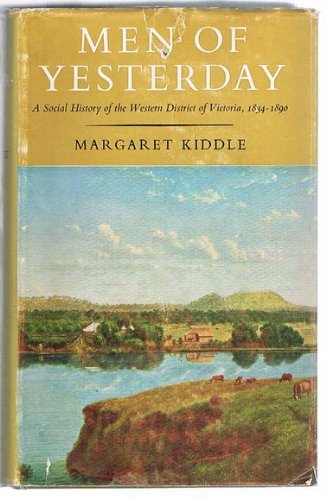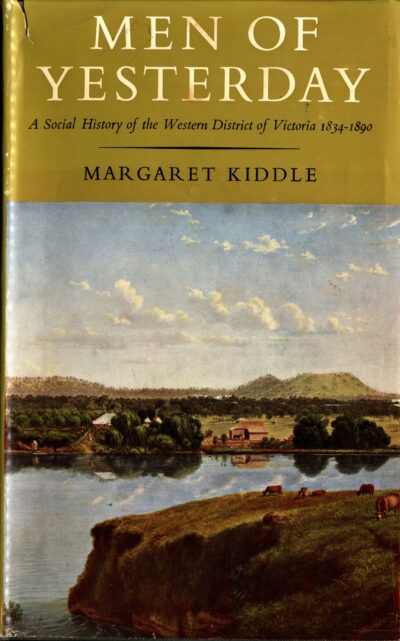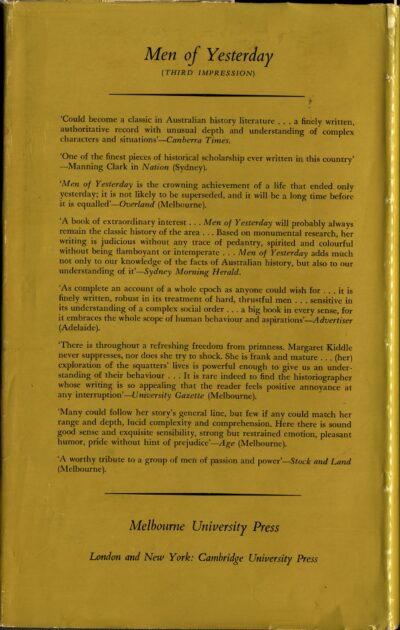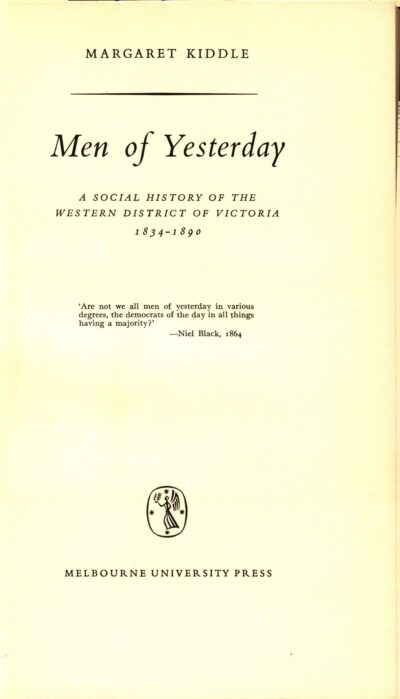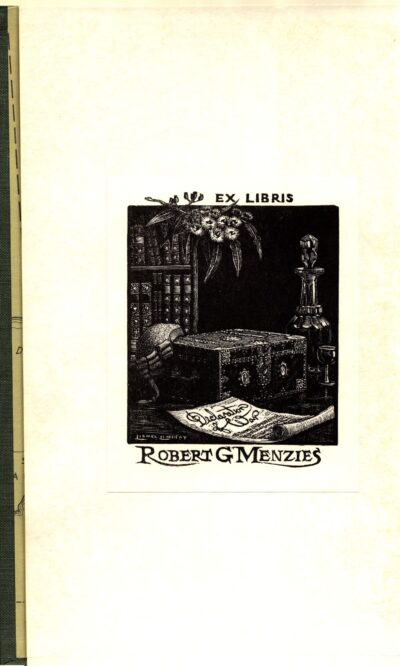Margaret Kiddle, Men of Yesterday: A Social history of the Western District of Victoria 1834-1890 (1963)
Margaret Loch Kiddle was a remarkable female Australian historian who is now widely recognised as a pioneer in her field.
Born in South Yarra in 1914, her family were fourth generation Australians who took great pride in their contribution to the development of the young nation. She attended St Catherine’s School and the Melbourne Church of England Girls’ Grammar School, before undertaking a Bachelor of Arts with Honours from the University of Melbourne. A gifted researcher, when the Second World War broke out she came to work on prices policy for towering economist and bureaucrat Douglas Copland.
After the war, she returned to the University of Melbourne where she worked as a tutor in the Department of History and quickly became noted for her passion and dedication. Encouraged by people like Professor Max Crawford for whom she worked as a research assistant, in 1950 she published her first academic book, a biography of celebrated humanitarian Caroline Chisholm which had originated as a Masters thesis. The book was greeted with a mixed reception, perhaps because its insights were inhibited by a lack of personal papers to dig through.
Not to be discouraged, a family friend suggested that Kiddle write something on the history Victoria’s Western District, and she was soon captivated with the idea. Trawling through settlers’ letters and diaries, she produced Men of Yesterday in incredibly difficult circumstances as she was slowly dying of hereditary kidney disease. The last pages had to be written with the assistance of a dialysis machine, described by friend and contemporary Russel Ward in tragic terms:
‘Towards the end she could only be kept alive being harnessed to a hospital machine, which continually recycled the blood her kidney could no longer handle. Her doctor, her brother-in-law, told me of her death. Her bed covered by a welter of research notes, papers and books, she wrote the last words of the manuscript, said to him, “Now turn that thing off”, turned her face to the wall and died.’
Kiddle was close with a number of celebrated historians, including Ward, Manning Clark, Geoffrey Serle, and John La Nauze. The latter helped fulfill Kiddle’s dying wish that her manuscript be published, and it became a classic of Australian historiography with proceeds going to the University of Melbourne’s history department in accordance with her will.
Men of Yesterday treats its subject matter with a nuanced combination of sympathy and brutal honesty – particularly when it comes to how the settlers treated Indigenous Australians. Despite its highly localised focus, the book received a number of positive international reviews which held it up as a model of how social and local history should be written. Its central theme and message are epitomised by its concluding passage:
‘The leaders of the pioneering generation had achieved more than they had expected. Many had intended that their colonial exile should last only until they had accumulated enough to be able to retire home in comfort. A few had done so, but even these had found themselves so changed by their experiences that it was difficult to take their places again in the Old World…. Their instinct for survival had led them from the Old Country. It led some of them to destroy the native population and others to prosper in the defeat of their fellows. It led, ultimately, to the birth of a new colony. They had sought only to exploit the land they took possession of, but as the years passed, they found that man cannot live by profit alone. They became rooted in the new country. In it they tried to recreate the Old World they had lost, but despite themselves, they founded and helped to build a new society.’
The book would have had a strong personal connection for Robert Menzies. Not only may he have had some fleeting knowledge of Kiddle given his intimacy with the University of Melbourne (and it is notable that the Menzies Collection also contains a copy of the Chisholm biography), but Menzies himself had been born in the Western District and his family might likewise be counted amongst its pioneers. They were certainly its representatives and advocates, with Menzies’s father serving as MLA for Lowan, and his uncle and political mentor Sydney Sampson serving as the Federal Member for Wimmera.
You might also like...
Sign up to our newsletter
Sign up for our monthly newsletter to hear the latest news and receive information about upcoming events.

